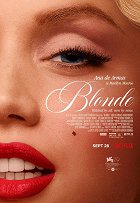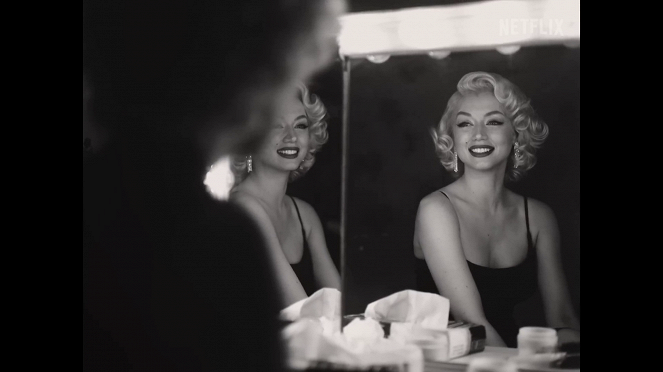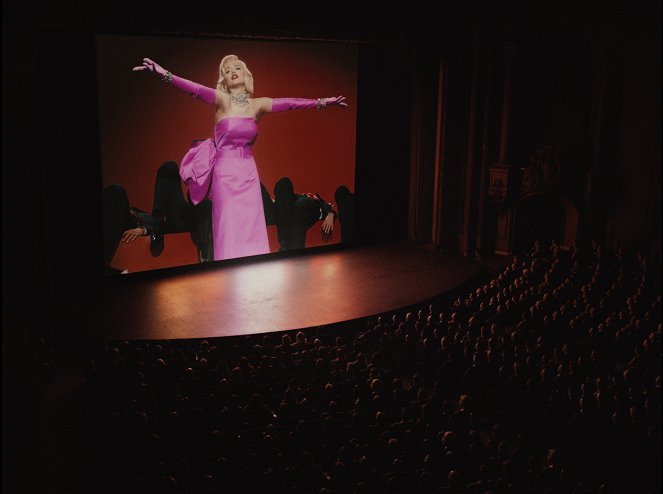Director:
Andrew DominikGuión:
Andrew DominikCámara:
Chayse IrvinReparto:
Ana de Armas, Bobby Cannavale, Adrien Brody, Julianne Nicholson, Xavier Samuel, Lucy DeVito, Sara Paxton, Garret Dillahunt, Scoot McNairy, Toby Huss (más)Streaming (1)
Sinopsis(1)
Based on the bestselling novel by Joyce Carol Oates, Blonde boldly reimagines the life of one of Hollywood’s most enduring icons, Marilyn Monroe. From her volatile childhood as Norma Jeane, through her rise to stardom and romantic entanglements, Blonde blurs the lines of fact and fiction to explore the widening split between her public and private selves. (Venice International Film Festival)
(más)Videos (2)
Reseñas (10)
Una película emocional para la tele. Un mosaico de las «experiencias» de una niña atormentada que busca su propia identidad y su lugar en el mundo. Atmosféricamente absorbente, pero innecesariamente largo para lo poco informativo que es. La constante alternancia ilógica de formatos de imagen y escenas en color con otras en blanco y negro corresponde a la confusa psique del protagonista. Un truco sencillo pero novedoso y que funciona bastante bien. Ana de Armas excelente, rendida y sentida. Es casi una pena tanto esfuerzo para una película que un público más amplio no sepa apreciar. Andrew Dominik tiene algo a su favor como artista, pero NO es Terrence Malick.
()
Casi tres horas de "porno de miseria" de apariencia de un programa de tele, que mata con su monotonía de estado de ánimo y visual después de los primeros 45 minutos. Ana de Armas ofrece una actuación entregada y envolvente, pero me gustaría verla en una película concebida de otra manera. Algunas escenas (especialmente las que involucraron al embrión) claramente cruzaron la línea del chantaje emocional cursi.
()
Estoy indeciso si esa película fue tan buena o tan mala. Lo que no tengo que pensar en absoluto es la actuación de Ana de Armas. Por eso no me sorprende que la película haya recibido nominaciones a los Razzies y Ana una nominación al Oscar. Esto solo subraya la contradicción general y la polarización. Al final, probablemente me inclinaré hacia una percepción positiva de toda la película, aunque sea rodada de manera muy no convencional pero ejecutada con precisión con un componente musical muy bien elegido, firmado por el mago Nick Cave. Estoy seguro de que Ana un día será galardonada por el Oscar...
()
No, I will not look for positives in it and try in vain to find any reason why I should at least like this film a little bit. Blonde is an artistic hell and it doesn't matter that Ana de Armas went all the way to the artistic core with her acting. Given the sexual and nerve-racking scenes, I actually believe her. But when they have no logic and connection, I can't completely reconcile with it. Due to the unauthorized biography on which the film is based, I actually don't even know what is true and what is a lie. They made Marilyn Monroe a poor little thing who got everything bad that Hollywood of the times offered. Often it was unbearable and that's actually the only thing that suits the film. Watching it is really very unpleasant and mentally demanding. Similar films are made by Gaspar Noé, for example. With him, unlike this film, I want to know what will happen next, maybe even for its credibility, which was missing here. Here it was downright torturous. On the contrary, I thought I would rather die from the unbearable length...
()
Blonde is an exceptional work for the same reasons many people hate it: its fragmentation, the excessive length of many scenes, the focus on the surface, the inconstant visual identity, the building of pressure without catharsis, it’s not an empathetic biopic but a pessimistic collection of horrors with a dissociated protagonist who wanders through her own subconscious – the whole film can be seen as her nightmare (also, the Badalamenti-esque soundtrack by Nick Cave and Warren Ellis is reminiscent of Lynch, who had prepared and ultimately shelved a film about Marilyn Monroe in the 1980s). The breaking down and decontextualisation of the myth and iconography of Marilyn Monroe work better in images than in Joyce Carol Oates’s graphomaniacal book on which the film is based (though the film uses the book’s narrative and storyline relatively consistently, its nihilism is closer to Ballard or Palahniuk). I understand that sexual violence, nervous breakdowns and ideas outside the boundaries of taste (a foetus talking to its mother) may be too much for some. I understand that not everyone will accept the concept of a film in which beauty is almost always associated with pain and sex with humiliation, a film that places the viewer in the extremely uncomfortable position of voyeuristic accomplice. However, I would expect critics to at least have the ability to distinguish between a real historical figure and a textual construct that serves a certain narrative or symbolic purpose, or rather between a misogynistic film and a film about misogyny (and the cruelty of the looks that strip a person of their identity and turns one into a projection screen for someone else’s fantasies). 90%
()



Anuncio